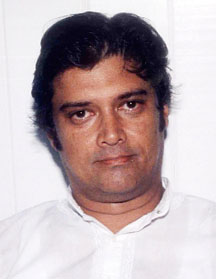Upholding a previous ruling by a special committee set up to investigate claims against University of Guyana (UG) lecturer Evan Radhay Persaud, the University Council yesterday ruled that he will be back on the Turkeyen campus with a stern warning.
The Council led by Chancellor Compton Bourne pronounced on the case yesterday, saying that it had been delayed for too long, according to sources. There are reports that Council member Freddie Kissoon attempted to raise an objection, but it was not allowed.
The Council’s decision came after it sought legal advice from the law firm of Cameron & Sheperd. The firm has found that the report of the special committee was flawed and that it would not be legally sustainable since Persaud was not given a fair hearing.
In a letter to Registrar Vincent Alexander, dated October 15, 2010, Cameron & Sheperd said the special committee failed to fulfill its mandate in accordance with university laws. “…We believe that the conclusion of the hearing of the special committee was flawed and that it was not reflective of a fair and just process,” the firm noted.
The special three-member committee had a mandate under statue 25 to investigate whether there was any basis to find that Persaud was guilty of grave misconduct and in so doing was supposed to give him a meaningful opportunity to be heard. It failed in both aspects, according to the law firm.
“We do not believe that finding of the special committee represented an acceptable standard of the administration of justice, quasi-judicial or otherwise…,” Cameron & Sheperd stated.

It said also that the University was in a position to do two things; reject the report of the special committee and conclude the matter by finding that charges against Persaud have not been proved or, if it may constitute another special committee under statue 25. However, the firm noted that the University was not obliged to do the latter.
The Committee set up to investigate the allegations against Persaud had found nothing substantial against him and recommended that he be reinstated with a stern warning.
As detailed by Cameron & Sheperd, under statue 25, the mandate of the special committee was to investigate the charge; to give Persaud an opportunity to be heard on the charges, either on his own or through a legal representative, and then to report its findings to the council.
The firm said that the documents provided in relation to the operation of the special committee indicate that Persaud asked to be supplied with certain information and was neither supplied with such information, and that he was also not supplied with the information which the special committee had in its possession. “In our, opinion, the failure to provide the material which the special committee had in its possession to Mr Persaud was a failure to give him a proper hearing,” the firm said. It continued that the special committee should have provided Persaud with all of the material in its possession in order that he could have taken such steps as he may have wished to take to challenge the allegations contained in that material and additionally, as well as “put forward whatever contentions he may have wished to put forward in answer to the allegations contained in the material.”
Additionally, the firm said that the special committee engaged in other matters which were outside of its scope as provided for by statue 25, by making general recommendations on discipline and other matters to the Council. “Its purpose was simply to evaluate the evidence made out against Mr Persaud in relation to the charge.
These recommendations were ultra vires and could be argued to be prejudicial to a final conclusion by the Council,” it added.
Further, Cameron & Sheperd pointed to the conclusion of the special committee, which was that there was a lack of evidence. The firm said this was surprising in light of the pages of transcripts of interviews, adding that it could not understand how the interviews became invalid because signatures were not attached to them. “…And we are unaware of any requirement at law that signatures be attached to interviews to ensure their validity”, the firm said.
It said too that the transcripts indentified the persons being interviewed, noting there was no reason why the special committee could not have recalled those persons to determine the validity of an accuracy of transcripts of the interviews.
In letters to University Registrar Vincent Alexander, students alleged last year that Persaud had victimised and intimidated them, particularly those sponsored by a mining company.
One student related that on the first day in class Persaud told them “Leave y’all God at the [expletive] door,” saying that he was god in the classroom.
Further, the student charged that most of the time spent in class was “sex talking time.”
The student also reported that a 2008 examination supervised by Persaud had been held at a city hotel and students who opposed this were victimised.
Student Ganesh Mahipaul, one of those who accused Persaud, has since rejected the report of the committee. He had prior concerns about the committee since according to him the panel was made up of people who were politically oriented. “This concerns me,” he said. He said the lecturer had a reputation in class for “playing up” his political connections, “which is why I am concerned.”




